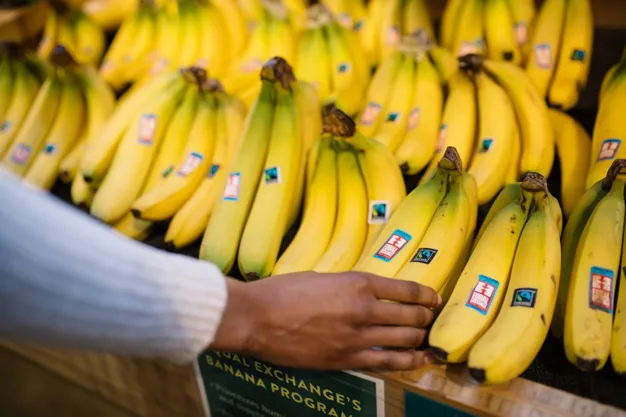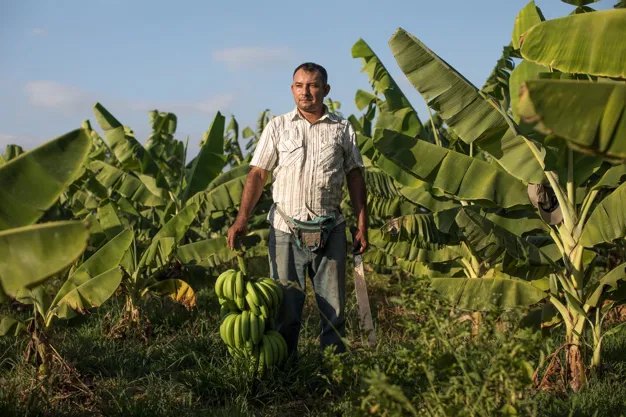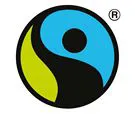Over the past six years, Fairtrade banana volumes have increased by 466 percent in Canada and 15 percent in the United States. “Today, we estimate that one in three organic bananas in Canada are Fairtrade, while the total Fairtrade market share of conventional and organic combined is estimated to be just above four percent,” says Rob Desson with Fairtrade America and Fairtrade Canada. Canadian retailers are increasingly responding to rising consumer demand for Fairtrade products. Fairtrade bananas, for example, have seen an impressive 86 percent volume growth in 2023 alone, with major retailers like Sobeys and Walmart launching Fairtrade organic banana programs nationally in 2022. Regional initiatives include Costco's warehouses in Ontario, Quebec, and Alberta, along with Metro in Ontario.
Given the strength of the Fairtrade Mark, retailers are clearly seeing the benefits of aligning with Fairtrade. “It’s the top ethical label in Canada and the most recognized and trusted label globally,” commented Desson. “The adoption of Fairtrade banana programs by retailers across the country, and the fact that close to three in five consumers who recognize the Fairtrade Mark are willing to pay more for Fairtrade products, proves Canadia consumers care about ethical and sustainable produce options.”
“While our U.S. presence is still developing, we are extremely optimistic about the future of Fairtrade bananas in North America,” commented Desson. Consumer awareness has shown a growth of 118 percent in just four years and interest from U.S. retailers is growing. “We are hopeful we can replicate Canadian levels of growth to continue driving positive impact amongst Fairtrade producers.”

Recent research found that U.S. consumers are willing to pay 66 percent more per pound for Fairtrade bananas. Credit: Angela Wu.
Price premium
While price is always a major factor in banana contracts, the desire to keep banana prices low varies from retailer to retailer. “Some retailers emphasize low banana prices as a key selling point,” commented Desson. “There’s also retailers that pride themselves on sourcing Fairtrade and organic products while others aim to pay living wages to banana workers.” Globally, retailers and vendors are increasingly investing in human rights and environmental due diligence (HREDD) work throughout supply chains, which is expected to become more prevalent in the North American landscape.
Recent GlobeScan research from Fairtrade International shows that bananas are in the top 3 most visible Fairtrade products in the U.S. market, and tolerance for higher prices increased from 2021 to 2023, rising from 43 percent to 66 percent. The price difference between Fairtrade and non-Fairtrade bananas is typically around $0.22 USD per pound (or $0.30 CAD) in Canada, and $0.30 USD per pound (or $0.40 CAD) in the United States. The same study showed that consumers are willing to pay a premium for Fairtrade bananas. In Canada, consumers are willing to pay 44 percent (or $0.30 USD) more per pound. In the U.S., consumers are willing to pay 66 percent (or $0.60 USD) more per pound.

Fairtrade works with over two million farmers and workers worldwide. Roberto Gallo (pictured here) grows Fairtrade bananas in Peru. Credit: Ángela Ponce.
Inspiring change
In addition to rising consumer awareness and increased retailer action, banana importers and marketers also play a key role in driving Fairtrade consumption. An example is Canadian Equifruit. “They live and breathe their values and set a high standard for other industry players,” said Desson. “By demonstrating it is possible to be a successful ethical business that values direct partnerships with banana producers, Equifruit is disrupting business as usual.” Since 2006, they’ve contributed almost USD 3 million in Fairtrade Premium, an additional sum of money democratically used by farmers to fund environmental, economic, and social projects. It’s not only that, but also their disruptive marketing is reaching younger, engaged audiences who are demanding more than just products from businesses. When Gen Z and Millennial customers believe a brand cares about its impact on people and the planet, they are 27 percent more likely to purchase it than older generations, according to the Harvard Business Review. “Equifruit is demonstrating that it is possible to change long-entrenched models of business in the banana sector and is doing it in a way that is exciting for consumers all while inspiring change in the industry.”
 For more information:
For more information:
Rob Desson
Fairtrade America and Fairtrade Canada
Tel: (+1) 613-563-3351, ext. 380
Robert.desson@fairtrade.ca
www.fairtradeamerica.org
